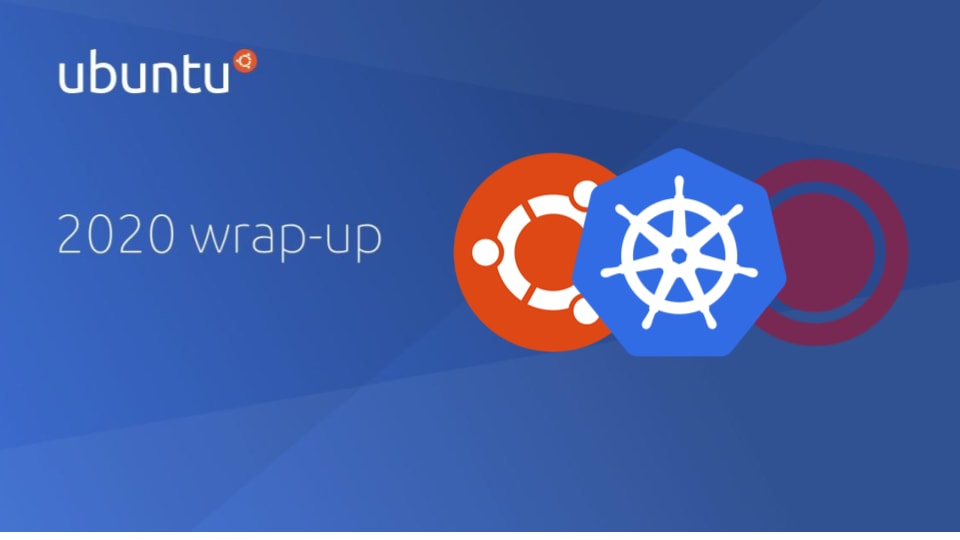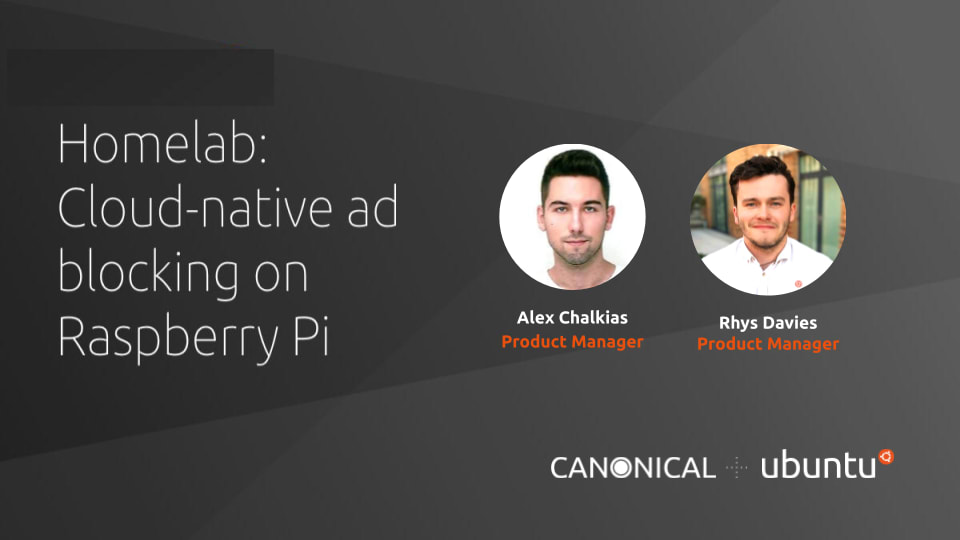Kubernetes and Ubuntu: 2020 roundup
anastasiavalti
on 27 January 2021
Tags: cloud containers , kubernetes , Kubernetes Ugrade , MicroK8s , News

We’re now well into 2021, and as we plan ahead for our roadmap and activities around Kubernetes for the year, it helps to look back and reflect on everything that took place for Canonical in the K8s space within the year that passed.
Kubernetes has always been a crucial part of Canonical’s vision and contribution to the IT world. All leading cloud providers, such as Google, Microsoft, Amazon, Cisco and IBM run cloud Kubernetes services on Ubuntu, because we focus on the latest container capabilities in modern kernels. This focus is why Ubuntu is also the top choice for on-premises enterprise Kubernetes, with MicroK8s, Charmed Kubernetes and kubeadm all supported by Canonical.
Canonical’s main Kubernetes news and announcements in 2020
1. Canonical’s Open Operator Collection extends K8s operators to Linux and Windows apps
As of November 2020, Canonical’s Open Operator Collection, the largest collection of application operators, supports both cloud-native and traditional applications on Windows and Linux. The collection is hosted at Charmhub.io and follows the Open Operator Manifesto. You can read more about this in the relevant announcement.
2. MicroK8s High Availability stable release

In 2020 Canonical announced autonomous high availability (HA) clustering in MicroK8s. Already popular for IoT and developer workstations, MicroK8s now also provides resilience for production workloads in cloud and server deployments. High availability is enabled automatically once three or more nodes are clustered, and the data store migrates automatically between nodes to maintain a quorum in the event of a failure.
3. Amazon EKS distro anywhere, in a snap
AWS and Canonical announced that, moving forward, EKS is available outside of AWS, on any Ubuntu system, with the EKS snap.
“Amazon EKS Distro (EKS-D) builds on our productive collaboration with Canonical around Ubuntu on AWS, and allows us to expand EKS beyond AWS cloud on any machine running Ubuntu. The full EKS experience now comes in a single, immutable package with automatic updates, for low-maintenance and increased security.”, said Nikki Rouda, Head of Product Marketing, AWS.
4. MicroK8s native on Windows and macOS
MicroK8s is Canonical’s lightweight, production-grade, conformant Kubernetes, packaged for simplicity and resilience. Installable on any machine in under 60 seconds, MicroK8s became widely popular among the K8s community, and so in 2020 we gave developers the ability to also use MicroK8s natively on Windows and macOS. Clean integration into the desktop means better workflows to dev, build and test your containerised apps.
5. Combining MicroK8s and WSL 2 for low-ops Kubernetes on Windows
To build on the ease of use we aimed for with the above, we also worked on pairing MicroK8s and WSL 2 for a low-ops, fully conformant Kubernetes through a single-command install within Windows.
6. Upstream Kubernetes release support
One of our most exciting K8s developments was announcing full enterprise support for Kubernetes 1.18, 1.19 and 1.20. Among others, this means support spanning from public cloud to edge, and new add-ons to unlock further capabilities for both MicroK8s and Charmed Kubernetes.
“Canonical’s drive is to enable enterprises by giving them the tools to seamlessly deploy and operate their Kubernetes clusters. We are excited to work with our customers and partners to deliver them an unparalleled Kubernetes experience,” commented Alex Chalkias, Product Manager at Canonical. Check out more details for each release:
Canonical & Ubuntu at Kubernetes events in 2020
1. Events sponsored by Canonical
Despite events becoming a bit less… physical this year, Canonical was still present in so many virtual events globally that it would be redundant to list them all. Certainly we couldn’t omit a reference to our presence at KubeCon Europe and KubeCon NA 2020 though, as two of the biggest events the community anticipates every year. We took the chance to speak with our Kube-friends, and showcase our Kubernetes demos around MicroK8s HA, Ceph, multus, edge, and more. Curious to watch them? Take a look at the links above!

2. Events hosted by Canonical
We love to attend a party as much as like to host one, and so we held a number of (virtual) events to chat Kubernetes with you.
Our localised panel events on Kubernetes offered a fantastic opportunity for IT professionals to hear our experts give genuine insight into their learnings from years of working with developers and enterprises on various Kubernetes use cases.
Another great ‘hit’ was our Open Operators Training Day – a co-located event we hosted during KubeCon NA. The event helped devops learn about the Open Operator Collection, an open-source initiative to provide a large number of interoperable, easily integrated operators for common workloads. We discussed where Open Operators come from and what the community is looking to build.
Due to high demand, we will be repeating the training on several occasions in 2021, so keep an eye out for announcements on our blog.
Articles and webinars explaining Kubernetes by Canonical
1. Articles on Kubernetes
There’s few things we love as much as talking Kubernetes – thankfully there’s also a big interest in the IT space to learn as much as possible about containers and K8s! So among other things, we created a page to comprehensively answer the common question ‘what is Kubernetes?’, as well as tried to offer some clarity around the topic of Docker, through a comparison of Kubernetes and Docker and a walk-through of how to switch the Docker container runtime to containerd with Charmed Kubernetes.
Looking at more specific Kubernetes use cases, we examined how Kubernetes is transforming the industrial edge, and why leading independent researchers teknowlogy | PAC rated Canonical as ‘Excellent’ for the particular space.
For those not familiar with Canonical’s lightweight Kubernetes solution, we explained in simple terms what you can do with MicroK8s, as well as its most common use cases.

As for our friends in the robotics field, a couple of examples of relevant K8s content include a walkthrough of how to run ROS2 on Kubernetes without the headaches, plus some solid advice on how to distribute ROS 2 across machines with MicroK8s.
Are you the visual type? Don’t forget you can watch loads of Kubernetes ‘how-tos’ on the Ubuntu YouTube channel.
2. Webinars on Kubernetes
One of our most popular webinars this year was around the different strategies for enterprises to accelerate Kubernetes deployment.
It was also great to get an external speaker to share his experience on Kubernetes with us and the community during the Ubuntu Masters conference. DBA guru Carlos Robles shared best practices, methods, and practical solutions to help you manage your SQL Server workloads on Kubernetes.
Finally, we loved hosting an interactive homelab with you, to teach you all about cloud-native ad blocking on Raspberry Pi.


What is Kubernetes?
Kubernetes, or K8s for short, is an open source platform pioneered by Google, which started as a simple container orchestration tool but has grown into a platform for deploying, monitoring and managing apps and services across clouds.
Give your platform the deep integration it needs
Canonical Kubernetes optimises your systems for any cloud, on a per-cloud basis. Maximise performance and deliver security and updates across your whole cloud. Per-cloud optimisations for performance, boot speed, and drivers on all major public clouds Out-of-the-box cloud integration with the option of enterprise-grade commercial support.
